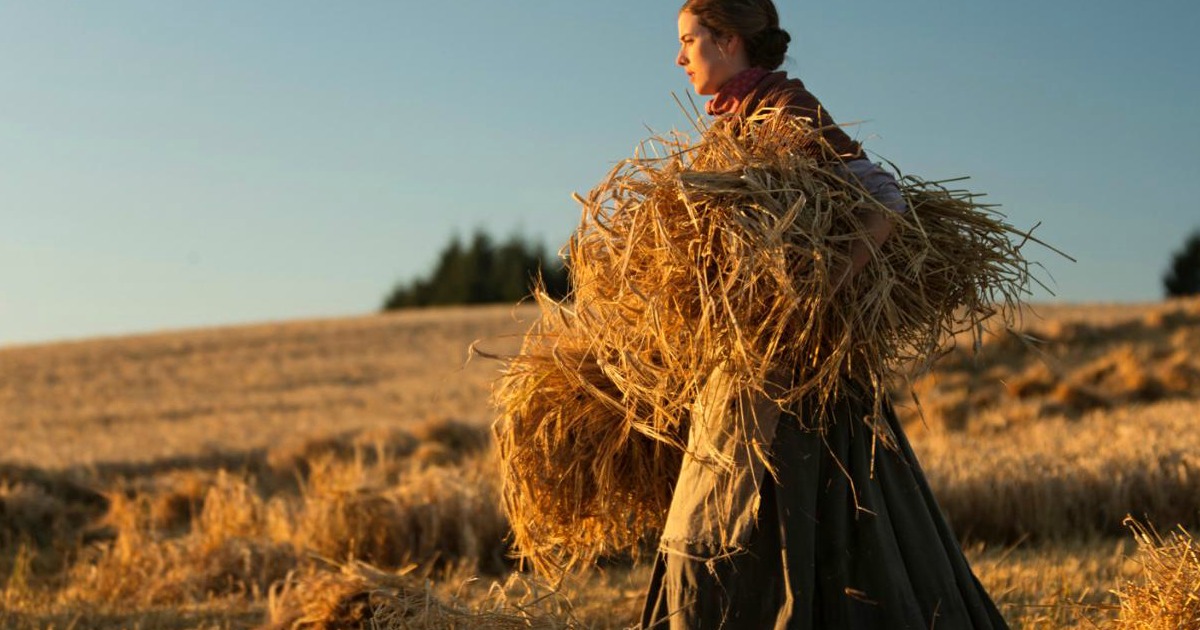
Despite being one of the most beloved art film directors of the last 30+ years, it’s a shockingly rare occasion that we are blessed with a new picture from filmmaker Terence Davies. With only Of Time And The City, a micro-budget, rarely seen essay film, Davies saw 11 years fall between The House of Mirth and his 2011 film The Deep Blue Sea. Thankfully though, that rate appears to be shrinking as his newest film, Sunset Song, debuts in theaters this weekend, and yet another film entitled A Quiet Passion is running the festival circuit.
But let’s not get ahead of things. Sunset Song premieres in limited release this weekend, and it’s yet another stunning achievement from one of the true masters of this era. Based on Lewis Grassic Gibbon’s 1932 novel of the same name, Song introduces us to Chris Guthrie, a young woman living with her family on their farm in the northern region of Scotland. Showing herself to be a truly independent spirit, Chris has hopes of becoming a teacher, and her achievements in school would have one believe that that’s absolutely within reach. However, as the viewer becomes privy to the nature of her home life, and the world surrounding it, her life goes in directions unforeseen. Very much embodying the gradual evolution of female empowerment in the onset of World War I, Chris is a vital character in this pastoral epic.
Structurally, this film is in many ways an absolute wonder. With time being an utterly fluid concept (as seen throughout Davies’ canon) we watch as Chris goes from bright eyed student with hopes of leaving for better things to watching as her violent father punishes not only her mother, but her charming brother as well, all leading to her falling in love with a local man who goes off to war to save his own fragile masculinity. Without even the slightest hint of a title card describing what time period the proceedings are set during, we get much of our contextual information from Chris’ voice over, and despite gaps of time being covered through various creative directorial choices, there is never a moment where the viewer feels disconnected or out of sorts.
Yet another literary adaptation from Davies, this is arguably one of his most rewarding pictures to date. As painterly a film as one will ever likely see, this is a far cry from the type of period pictures one has become accustomed to. The camera here allows the emotions to come through fully as Davies knows when to evoke genuine awe with bravura moves or compositions and other times he simply leaves the camera to linger his characters faces (the first time Chris meets her future husband, Ewan, is a symphony of glances). More a domestic melodrama than a real costume period piece, Davies is at the absolute height of his powers here, crafting a film that is gorgeously composed and shot with beautiful precision by director of photography Michael McDonough.
Seen through the lens of a domestic melodrama, the narrative here is utterly engrossing. With time flowing naturally and without any real attention drawn to it, we watch as Chris navigates a world that is as changing as the patriarchy that leads it. With her father going from utter son-of-a-bitch to having suffered a stroke and needing his daughter to tend to him, the film is full of subversive takes on gender dynamics, and the film’s final act is as haunting a look into both the fragility of masculinity and ultimately PTSD as one has seen in quite some time. Davies knows this literary world like the back of his hand, and this is a drama that has much more meat on its bones than one would ever expect from a film with all the bells and whistles of a modern costume drama.
It also helps that the performances are superb. Agyness Deyn stars here as Chris, and she’s a complete revelation. We watch as she goes from wide eyed student with dreams of big things, to caretaker, to wife and ultimately to becoming a mother, and there’s never a false moment within her performance. There’s a rich inner life here, making this character feel lived in and both of a specific moment and completely universal. Peter Mullan is at his best here as Chris’ bastard of a father, a role that could easily be played as simply a one note monster but thanks to Mullan’s skill as a thespian there’s a touch more nuance to the character, giving the film an even more emotionally resonant center. Daniela Nardini plays Chris’ saint of a mother, but it’s Jack Greenlees as Will that really steals the handful of scenes he’s in. There’s a lot to dissect within his performance, but it feels as though his entire performance consists of far away glances and unsaid truths. His relationship with Chris is a deeply touching one, and their scenes together are some of the best in the film. Finally, Ewan is played by Kevin Guthrie, giving a fine performance but one that lacks the same level of nuance as the rest of the cast. There’s pain behind his lashing out in the final act, but the roots within the idea of PTSD are simply not as rewarding intellectually or emotionally as the idea of this man going off to war for the simple fact he didn’t want to be the focus of public ridicule. Davies has always been interested in masculinity and it’s clear that this is the thread he’s most intrigued by.
With only four years between this and The Deep Blue Sea, and another film already on the way soon, this is becoming a shockingly prolific period for a filmmaker who had found it increasingly difficult to find support for his pictures. Hopefully he keeps at this tempo, because the world is a much more rewarding place when films as genuinely and profoundly moving as Sunset Song are made.



